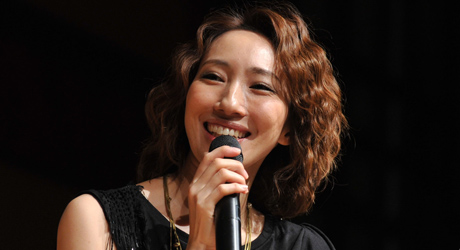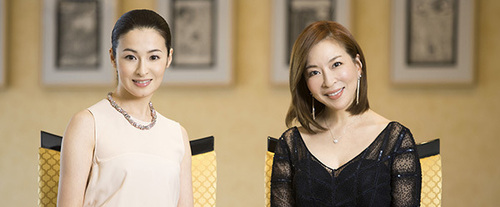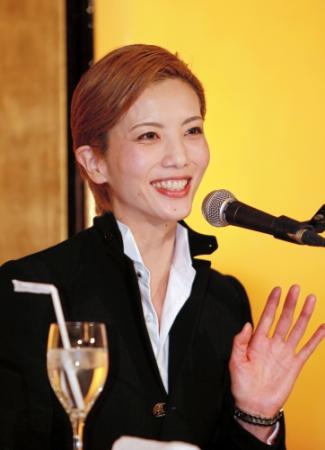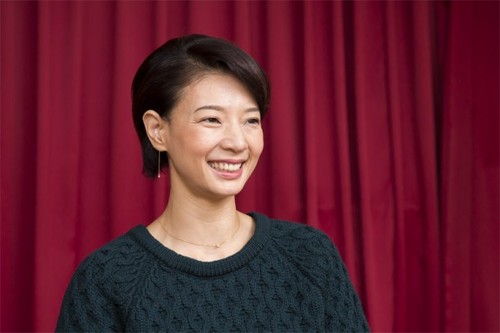Mizu was a guest speaker at what looks like some kind of career convention sponsored by a technology company. It’s a bit awkward how the interviewer keeps relating everything back to her company, but Mizu has some awesome stuff to say.
What’s the “male spirit” inside a woman?
Actress Mizu Natsuki
From the ultra-competitive Takarazuka Revue, we present a top star who charmed a huge number of people, Mizu Natsuki. Since she turned to the career of an actress, how does Mizu-san, constantly expanding her fields of activities and continuing to sparkle, overcome her obstacles and difficulties time and time again? She spoke to us about everything from her view of life based on her experience in Takarazuka to her strength as a woman she got from mastering the otokoyaku.
Interviewer: HY, Managing Director of Accenture Technology Consulting
HY: Hello, Mizu-san, thank you for being here.
MIZU: Thank you for having me. This time, since I was invited to speak with Accenture, I read the homepage. The president’s words, “It’s not just the profits, but the success of the business partner that is a company’s true gratification,” are written there, and I got a strong feeling that that part is related to the entertainment industry.
HY: I’m so happy to hear you say that the entertainment industry has something in common with our job. Most people might think that the path you walked as an actress and a Takarazuka top star is totally different than that of an Accenture employee in our field. However, as a top star you had to exhibit leadership, and Takarazuka is a place where it’s necessary to refine yourself in dance and singing, not to mention various other skills. Since you left Takarazua in 2010 you’ve truly branched out into a different field, taking on the activities of an actress. I suspect that part of your experience is similar to the problems and challenges we encounter from day to day. From what I see just looking around, there are a lot of young people here. Mizu-san, when you were young, how did you go about building your career?
MIZU: In Takarazuka, there’s something called Shinjin Kouen. For one day only, just the underclassmen get to perform in the Grand Theater, and the program is exactly the same as the actual show. In my third year, I had the privilege of being selected for the lead in one of those shows. Of course, I’d held the aspiration of wanting to appear in a lead role someday, but I was thinking a lot about whether that was the right time, if my preparations regarding singing, acting, and dancing were in order, if I’d arrived at having enough confidence in myself to be able to appeal to people. But even though at that time I felt like I was under-prepared, this chance was dropped in my lap. Even though this was the sort of chance that every member of Takarazuka hoped and longed for, I thought, “If only this turned out to be a bad dream……..” No matter what I did, every day, something didn’t feel right. It was like, “I have to play this lead part, what on earth should I do.”
HY: How did you overcome that?
MIZU: In that Shinjin Kouen program, it was a role that Amami Yuuki-san played in the real show. When Amami-san was an underclassman, she had the same experience as I did of being selected for a lead shinko role, so she said to me, “I can understand the tremendous worry you’re experiencing right now, so please ask me anything.” For that role, I had to handle a hat in a cool way and quite a bit of skill was needed for that, and she gave me the advice, “You should take that hat home with you, every day, and practice with it until midnight. Because if you do it until you’re sick of it, you’ll definitely be able to master it.” In the beginning, I turned my eyes away from reality, but if you keep on procrastinating day after day, your deadline steadily approaches, and your impatience comes out. If you get like that, reality catches up to you. Even though I kept running away, the day of the Shinjin Kouen came.
HY: When I hear that, I can really sympathize with you. It’s the same feeling we get in our job when a presentation approaches.
MIZU: You’ve got no choice but to do it. As far as not being able to run away is concerned, that time a switch went off. Because the switch went off, as the Shinjin Kouen, approached, I continued to challenge everything every day.
HY: When everyone is troubled, they listen carefully to their superiors. We might not have Amami Yuuki-san in our company (everyone in the assembly hall laughs), but we do have reliable superiors. Everyone in that position, with the intention of becoming like Amami-san, let’s listen closely to what’s being said and give advice.
Mizu-san, at the beginning, you said you understand part of the Accenture motto, “It’s not just the profits, but the success of the business partner that is a company’s true gratification,” as it relates to your job. Is there a concrete example you can give of a time you were able to feel like you shared that sentiment?
MIZU: In Takarazuka for instance, to talk about a typical day’s schedule, the whole morning would be filled with lessons and interviews and things, and then we’d rehearse from the afternoon until 10 o’clock at night. Since the rehearsal room was still usable from 10 to midnight, we’d take it upon ourselves to have lessons, and then when we returned to our rooms we’d study our scripts; every day was like that.
HY: So there’s a ton of effort going on behind the scenes.
MIZU: In Takarazuka, I thought about theater and acting and musicals all day long. There were days when my whole body hurt, and there was pressure not to miss performances even if you were sick. But still, when I went out on stage for the finale, and saw all the fans applauding, the feeling of how much fun they had would well up, and this turned into my own joy. I received energy from everyone, and everyone enjoyed the performance that I poured my heart and soul into. It’s like a swapping of energy. That would become my driving force for moving on to the next thing.
Working at Accenture, you must have to support other people’s companies. If you simply think of that job, doesn’t ambition surge up inside you? The feelings you have for other people’s companies, and being able to please each person in those companies, the point of that becoming your own satisfaction, I think that really resembles my job.
HY: For all of the Accenture employees too, I think that more than simply working to raise your own achievements, contributing to the satisfaction of the client makes you reliable and enables you to gain trust.
MIZU: The bigger the mountain you have to climb on a project, the bigger the sense of accomplishment when you reach the summit, and there’s a feeling of solidarity that comes from it, isn’t there. It’s not something you can express in words, or calculate in numbers, or whose value you can measure in money.
HY: You could also say, the harder the project, the tastier the drinks are when it’s over (haha).
MIZU: But, until you become top it’s a competitive community. In order to stand out from the person next to you, you’ve got to perform while thinking, “What’s my own special charm?” Even so, at times when I was thinking, “Argh, being treated the same as everyone else is rough,” there would be troupe reassignments, and it went from going along with the crowd to “Please figure this out yourself.” To that extent, even though I’d thought I wanted stand out as one person, it was scary and I couldn’t take it. On stage, when I’d come out alone, I felt like “don’t look at me!” When I was competing with everyone, I could do my best. But being able to persevere when left alone, I started to realize that takes true courage. If you lose to the mental aspect of it, your body breaks down too. Because of all the pressure I put on myself on stage, such as “it’s scary” or “what do the fans see in me” or “if only I was a better singer,” my physical condition was destroyed.
HY: How did you get over that?
MIZU: Whenever I was standing on stage, I absolutely did not let the severity of my physical condition show. I refused to lose to myself. If my body stopped functioning, then it would be over. I thought about how I could thrive on the chance I’d been given. I fell to the very bottom, and from the spot I fell to, one day in a flash I asked myself, “What do you really want to do? Why do you want to perform on stage?” I couldn’t go on like that, and I was able to revive myself.
HY: Did you gradually get used to your position of having solos?
MIZU: Pretty much. In Takarazuka they sell stage photos to the fans. When I was an underclassman, in the photos they shot I had weird faces, weird poses, weird makeup… there were nothing but weird photos (haha). As I became an upperclassman, the number of good photos gradually increased. The gap between how I appeared on stage, and the performance I wanted to give, became filled. If I do that it appears this way, or when I act this way it falls flat; in this way I started to be able to build myself up while objectively analyzing the things I was doing. Even within the concept of otokoyaku, I began to gain an understanding of what kinds of roles suited me, what performances enabled me to exhibit the most power, what my “type” was. I began to design myself, and as for my self-confidence, I came to be able to walk on my own.
HY: In our work too, in order to differentiate ourselves from other companies, so that we don’t end up following the crowd, we must always be conscious of our strong points. Even with this event that’s going on right now, the theme is trying to consider anew how our assets, experience, and skills can become like our career capital, and it’s become a place to reaffirm our strengths. From this point of view, what do you consider your strengths?
MIZU: Hmmmm…..I think my strength is my tenacity. I think it’s the same no matter what your job is, but there are times when you haven’t made much progress, right? Times that make you say, “Even though I’ve been practicing this much, I’m still no good.” But, if you give up there, you get zero. On the other hand, if you keep plugging away, day after day, little by little it adds up. The moment you realize, “ah, so THIS is how you do it!” finally comes. That moment of recognition is gratifying, and you gain confidence. Even if your progress is slow, when you can sense your growth that has piled up in tiny increments, at some time after that, you’ll come to believe, “I won’t give up, I’ll get on without being bothered by little things, and I will definitely have discoveries and realizations that lead to growth.”
HY: Everyone, isn’t that exactly the same in your work?
MIZU: Entertainment is simple work. Things whirl around on stage, and if some kind of balance can exist, even if that balance is put into words and taught to you, it serves no purpose unless you experience it for yourself. To master something there’s nothing you can do but keep learning time and time again. It’s really simple, and it may be a small thing, but I think it’s most important to keep going without letting the little things get you down.
HY: How was it when you became top of Yukigumi?
MIZU: Well, when I became top, it wasn’t my own feelings, but whether or not the fans would accept me as top that was most important. I got the title of top star the day after the previous top left, but that didn’t mean all of a sudden that day I’d become good at singing, good at dancing, and able to charm the audience with my acting. What could I do from the time it was decided I’d be top until I actually performed in my introductory show? It was a song-heavy show, but nevertheless in my impatience I lost my voice, and I fell into a lethal situation……. I was really churning with anxiety about how long I’d be able to perform as top.
HY: After you became top, in 2010 you retired. Is there a big difference between Takarazuka and the work you’re doing now as an actress?
MIZU: They’re totally different. First of all, the standard for an otokoyaku is pants style. I didn’t wear skirts at all. Since my arms were slender and appeared feminine, I wore long sleeves even in the summer. My hair was short. Anyway, just doing guy things was like a revolution! On the contrary, now as a woman, even when go to photoshoots, I’m told, “Wow, the emotion in your eyes is so intense!” Like when you look at the pictures, there’s a force in my eyes that comes shooting out of the screen (everyone laughs). Ah, so I can’t open my eyes wide that way. Later I realized I can’t spread open my underarms. When I was an otokoyaku, I’d express manliness by opening my arms wide and making my body appear larger. So everything that I’d studied for 20 years was wrong. I had to analyze everything bit by bit, and find out all the ways I was different from a woman (haha). Everyone said to me, “You were born a woman, so you’re fine the way you are now,” but things like the way I’d arrange my legs were CLEARLY wrong. The first 2 ½ years of being an actress were really difficult. I still have such a long way to go. Even though I’m so careful about coming across like a woman, I’m always told, “You’re really masculine after all, aren’t you.” It feels like “Argh! It’s still not enough!”
HY: Since you accumulated 20 years in Takarazuka, it’s not so simple to change, is it. But, I don’t think there are that many women who think that hard about being a woman.
MIZU: That’s probably true. I’m always thinking about what it is to be a woman, etc. Like what can I do to be seen as a woman?
HY: What do you think?
MIZU: Of course, it’s a mental thing. Since I left Takarazuka I’ve been trying to be more feminine visually, like I’ve been wearing skirts, and going to the nail salon, but in the end I have a feeling it’s really mental. Kindness and maternity. Beyond that, the “male spirit” that a woman has can also be a woman’s strong point. Because that is there, I think I can face life positively, and it helps me overcome obstacles.
HY: I hope there are a lot of women in our company with “male spirit” too.
MIZU: Why, if they don’t have that before a presentation, does it go poorly?
HY: That’s right. Well then, Mizu-san, as someone who’s gone from Takarazuka top star to actress, you’ve attained a position that a lot of women yearn for. What’s your secret to success?
MIZU: I wonder if it’s greed. I think I have a taste for fun, deep emotion, and gratification. I think I want to savor the atmosphere of the summit I’ve reached even more. But I also want the taste of different scenery, and stronger emotions. Since that’s not something you can attain by walking a flat road, I want to feel the things you can only feel because you experienced troubles while passing through a thorny path, and since I want that, I feel like I can do my best. Beyond I also understand without a doubt that there are gifts. If you doubt yourself along the way, it’s over. Only those people who believe in themselves and steadily progress will have the state of mind of being able to reach the summit. Isn’t it the same with skincare? Doing it day after day, it’s so bothersome! (everyone laughs) But, because you do those little things, 10 years later, there’s a huge difference.
HY: Work is like skincare, it accumulates, huh (haha)
MIZU: If you have talent and willpower there’s nothing you can’t do. But, If you have talent and do nothing, I think the people with no talent and willpower will surpass you. Since I didn’t have much talent, I got by on willpower. By immersing myself in my own willpower, the result I got was Takarazuka top. On the other hand, it was also important for me to accept my lack of certain abilities. When I failed, rather than pretending I hadn’t failed, it was better to be sufficiently hurt, and to feel thoroughly upset. Then without giving up, I’d inspect my failure, and if I found something new to work on, next time for sure, I’d have a thorough understanding of it in my performance.
HY: Thank you so much for all of your strong messages.




